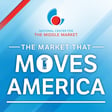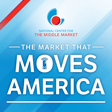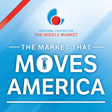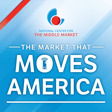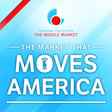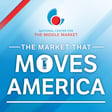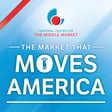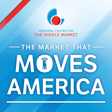Become a Creator today!Start creating today - Share your story with the world!
Start for free
00:00:00
00:00:01

Diverse Voices in the Emerging Middle Market
Listen in as Terry Hill, Co-Head of Emerging Middle Market for JPMorgan Chase Commercial Banking, and Charisse Conanan Johnson, Co-CEO of Next Street, dive into the unique challenges and opportunities within diverse-owned middle market businesses. Our guests share their expertise and experiences to help uncover the nuances of this vital sector with a discussion about the knowledge gap, capital challenges, and the crucial role of mentorship and networking. Discover the data-driven approach that uncovers the narrative of underrepresented groups and highlights the immense potential within the diverse middle market.
Click this link to read the report published by JPMorgan Chase and Next Street.
Transcript
Introduction to the Podcast
00:00:04
Speaker
Welcome to The Market That Moves America, a podcast from the National Center for the Middle Market. The center is the leading source of knowledge, leadership and innovative research on the middle market economy. Throughout our podcast, we will feature middle market leaders and stakeholders to hear their real world perspectives on trends and emerging issues. The U.S. middle market is a unique collection of companies spanning different industries, geographies and revenue sizes.
00:00:31
Speaker
but they are also founded, owned, and run by a diverse set of leaders.
Introducing Guests: Terry Hill & Cherise Conan Johnson
00:00:35
Speaker
In this episode of The Market That Moves America, we'll hear from leaders at JPMorgan Chase and Nextree, who collaborated to study and understand minority middle market businesses and those based in key markets across the country.
00:00:50
Speaker
Welcome to The Market That Moves America. My name is Doug Farron, Managing Director here at the NCMM. And today's podcast is a discussion on the emerging middle market and the diverse business landscape within it.
00:01:05
Speaker
Joining me today is Terry Hill, who is the co-head of Emerging Middle Market for JP Morgan Chase Commercial Banking, and Cherise Conan Johnson, who is co-CEO of Next Street. Terry, Cherise, welcome to our podcast. Yeah, thank you, Doug. Really glad to be here. Same, Doug. It's a pleasure.
Roles and Missions: Next Street & JP Morgan Chase
00:01:29
Speaker
Well hey can we start by just having each of you do a little bit of introduction on your background your experience your current roles maybe kind of the focus on the middle market. Charisse I'll start with you and then we'll move to Terry. Thanks so much Doug. Well I am co-CEO of Next Street.
00:01:51
Speaker
And at Next Street, our whole mission is to design and develop solutions to connect entrepreneurs and small business owners with the right resources at the right time.
00:02:06
Speaker
And as I lead this organization with my co-CEOs, my goal is to make sure that we work with our institutional clients, which are governments, philanthropy, corporations, community development, financial institutions, all to make sure that small businesses get what they need. And so our connection to the middle market
00:02:28
Speaker
is actually a strong evolution from small business. So small businesses often want to know, well, how do I grow? How do I scale? And so they're scaling into the middle market, typically. And so it's just natural for us to be thinking about these two segments, but particularly focused on the middle market so that we can help our clients have more impact
00:02:54
Speaker
with business owners so that they can continue to contribute to our economy. Great. Terry, can you tell us a little bit about your background leading the emerging middle market for JPMorgan Chase and what that role entails? Yeah, sure, Ken. I've been with the firm for over 25 years, and in this role is co-head of emerging middle market.
00:03:21
Speaker
We work with privately held midsize businesses across the US. We have bankers in about 150 locations all over. We're thinking of really whether on the ground or indirectly with companies in all 50 states. At JP Morgan Chase, we are committed to supporting business owners at every stage of their journey.
Challenges in the Middle Market
00:03:45
Speaker
And so our focus in our emerging mental market is delivering exactly what these companies need and these business owners need at this point in their life cycle. And it's a really exciting place to be because it's really where complexity is beginning to show itself. And we're bringing the resources and intellectual capital of AP Morgan Chase to help tame that complexity and ensure that our business owners and the businesses
00:04:12
Speaker
can grow safely, securely, and quickly, and leverage everything that we have that can support them. Yeah, that sounds great. I'm going to stick with you for my first question, Terry, which is about JPMorgan Chase's interest in this study. So kind of taking a look at the emerging middle market. What was the driver of that, and why was it important? Yeah.
00:04:41
Speaker
Given what I just talked about, you and I share a love of this part of the market, right? And I think what we also share is knowledge. It's one reason I really, really appreciate what you all do. We share the knowledge that this is a really important part of the market, but under reported on, maybe under understood. Lots of focus on business banking, lots of focus on large corporate,
00:05:11
Speaker
sort of this part of the market that while it's only about 5% of the total businesses across the country, it's about a third of all revenue generated and about 30% of all private sector employment. So a really, really important place to be. And we wanted to ensure that industry leaders and stakeholders understood the landscape and the needs of these really important businesses across the country.
00:05:41
Speaker
With that, then you have the information that you need to meet these unique needs and support the long-term growth. It's important to the businesses and it's important for our business community. Sure. We say here at the center, it literally is like the middle child, and I can say that from experience because I am a middle child.
00:06:03
Speaker
but all the attention, you know, on the big and the small, but the middle tends to get lost. So that's really interesting to hear. Charisse, you kind of answered this a little bit in your introduction, but I'll ask you the same question. It was kind of why this was important for Next Street to be a part of emerging middle market research.
00:06:21
Speaker
Absolutely. I mean, part of the solution set that Next Street offers to the market in general is around our research. We live and die behind the numbers, the in-depth nature of understanding underlying challenges and opportunities.
00:06:43
Speaker
And so it was natural for us to conduct this comprehensive analysis on the middle market. And again, it's tied to what's underneath it or what comes before it, which are smaller companies. So for us, we wanted to take that same approach to shine a spotlight on the particular characteristics of middle market businesses and particularly, you know, again, how do we highlight and better support
00:07:13
Speaker
the focus which we had on our report with JP Morgan is supporting diverse owned mid-side businesses because of the opportunity that it represents. And so it's just really important and that resource component and being armed with data because often we might speak and I'll say the market at large in anecdotes, but being data informed and being data rich is really important to get to
00:07:41
Speaker
palpable and important solutions for the overall economy. Yeah, that's a great segue into my next question, which is, could both of you kind of tell us behind the scenes, like what motivated you to join forces as organizations to look at that diverse owned segment?
00:08:02
Speaker
Absolutely. Maybe I start and Terry can come on in. First of all we JP Morgan and next we have had a long standing history of working together. So it was just natural for us to do so over the years.
00:08:16
Speaker
And then we share, I believe, a desire to demystify. You know, I think you talked about sometimes the middle gets left out. And that demystification is so important so that when we're having the important conversations with different stakeholders, we can talk with a common language, number one. And again, we can be informed by the data.
00:08:43
Speaker
And what we saw in the research, for instance, is that diverse owned businesses, you know, they make up 30 percent of the middle market. And because of Next Street, we have an anti-racism commitment.
00:08:58
Speaker
which allows us and provides us with a strong value in making sure we tell the stories, tell the narratives of underrepresented groups, underrepresented communities and diverse owned businesses. You know, the broad definition of that, you know, really falls underneath that. And so that's that's really important to us. And we want to make sure that the broader market understands all the various dynamics.
Diverse Middle Market Businesses: Challenges & Insights
00:09:25
Speaker
Sure. Yeah. Terry, anything to add to that?
00:09:29
Speaker
Yeah, so we understood just from being in the market that there's differences with underrepresented businesses and business owners, but really wanted to understand and do some analysis and understand some details of what that might look like. When you think about understanding the needs, then you understand the opportunities. And when I say that, I mean a business opportunity because that is what drives
00:09:58
Speaker
our economy. But also, where are the opportunities to really make an impact on growth of our communities and on underrepresented businesses? And so it was an opportunity to really get analytical and understand what you might just be seeing in the real world around us. But what does the data show us when you really dig in and understand the data?
00:10:27
Speaker
Yeah. And that's where I wanted to go next, Terry. So I'll stick with you for this one, which is, you know, as you mentioned, the similarities between the center and what you do kind of living and working in this space with these companies. We know that they're not like small enterprise business. They have their own kind of unique characteristics from the research. Could you just give us a sense for maybe some of the unique challenges that were
00:10:56
Speaker
uncovered for these diverse middle market businesses? So, the middle market is a wide market. You know, though we said it's only 5% of the overall, you and I both know, and many of the listeners know that it's a wide market. What's interesting about this, and I spend, for our firm, I spend a lot of time with our veteran business owners. I'm a veteran myself. And their experiences are very similar to the other underrepresented business owners.
00:11:26
Speaker
And you see this in Charisse's report that these businesses end up, from a data perspective, you see this, they're younger and smaller and they're growing rapidly. And then you also hear from them that both in the real world and in the report, if you will, that there's a knowledge gap, there's a capital gap,
00:11:57
Speaker
there's a gap around mentors and networking. And, you know, that does go with capital and knowledge, but those are some of the key areas that we see. So it's really interesting because you have younger, smaller, rapidly growing companies that have tremendous opportunities. In fact, they're growing faster than our non diverse businesses.
00:12:22
Speaker
what we see is around 32% revenue growth for diverse owned businesses and about 19% for the nondiverse. So, younger, smaller, rapidly growing, really exciting, but there's some key gaps that
00:12:40
Speaker
around things that we would say are building blocks and, you know, areas that we focus an awful lot on with all of our business owners. And so then, then, you know, and I'll let Charisse talk a little bit more about that, but then you begin to say, well, you know, how can we address some of those and we can, we can talk about that later. But Charisse, what would you tease out of your, out of your analysis that I didn't, that I didn't bring up?
00:13:09
Speaker
Thanks, Terry. And you're absolutely right. I mean, you mentioned diverse owned businesses being younger. And Doug, it's really to the tune of on average 10 years, which, which is significant, generating lower revenue. I mean, with diverse owned businesses making up 30% of the middle market by sheer number, they only account for about
00:13:35
Speaker
20% of the revenue, and this is a $13 trillion market. So that's actually pretty big. I mean, even if we were to put diverse owned businesses on parity with non-diverse businesses in terms of a revenue, that's 1.3 trillion in additional revenue, again, to the opportunity.
00:13:54
Speaker
But some of the other details, right, when you have a maturity gap in terms of younger and you have a valuation gap because you have a little revenue, which ultimately affects your enterprise value, then there's the consequence of disparities in wealth. And that's really big, right? You also see from our findings that diverse owned businesses
00:14:22
Speaker
on average employ fewer employees. But proportionately, more employees who are people of color. So that's an interesting one because you have these diverse owned businesses that are also intentionally focused on employing people of color. And so when we talk about types of jobs and also, again, closing the wealthy gap in this country, you know, having a job is also a way to do that, right? What we also found
00:14:51
Speaker
around unique challenges for diverse owned businesses is that 16% could not access financing despite needing it compared to their non-diverse owned business counterparts where the number was more like 6%. And so like these disparities in also access to financing, whether it's because of high credit costs or difficulty navigating the application process, lack of confidence are all things
00:15:20
Speaker
that showed up in the data. And then finally, I would say it's interesting because we did deeper dives in three specific markets. And those markets are Chicago, Dallas, and Los Angeles. And across all three for diverse owned businesses, one of the biggest challenges that they faced was specifically related to revenue and sales growth, which, again, if you tie that back to the revenue gap,
00:15:50
Speaker
that seems to jive with the data in terms of what they told us. And so that alignment around revenue and sales and getting more opportunities is going to be really important, particularly for our diverse owned businesses. Yeah, those are really, really interesting insights. And thank you both for sharing them. I mean, I think it definitely speaks to the need to do this type of research because those
00:16:20
Speaker
thoughts and those characteristics are, they're widely unknown, right, until this type of study sheds light on it. And what you were just saying, Cherise, kind of resonates here because we
00:16:34
Speaker
We have a program with JPMorgan Chase, I believe, called Ascend, where some of our faculty work with the Minority Supplier Development Council to help grow these businesses. And that's exactly one of the things they point to is just access to growth opportunities, new markets, new customers. So I think that one is spot on.
00:16:57
Speaker
So it sounds like you both have professional, but some personal connection to this work. Can you, maybe Cherise, can you start by telling us a little bit more about that? Absolutely. And so over the arc of my career, I have been in the spaces around finance. I actually started and grew up at JP Morgan in their asset management division.
00:17:26
Speaker
And then I made the move over to entrepreneurship and starting a small business. And I ended up closing my business because we couldn't scale and we couldn't actually make it past small into mid. And so personally, I experienced the challenges and being a diverse, of being a diverse owner and not being able to get to that mark.
00:17:50
Speaker
And so it left an impression upon me, what are also the systemic issues that are here? Why even with someone with my pedigree and some of the experiences that I've had, I had trouble. And not to say that all businesses don't have trouble, but it left a taste in my mouth and that's actually why I joined Next Street. And my whole career has been around wealth creation, business ownership and wanting equity and outcomes.
00:18:20
Speaker
And so shining a spotlight on the diverse middle market business is personal for me and the opportunities that lie there in like, so what are we going to do about it? What are the solutions? And so that brings it close to home, obviously, in terms of the company I'm leading at Next Street and our mission to, again, develop solutions for the whole continuum of business owners.
00:18:45
Speaker
And then I would just say, again, back to our commitment, which is driven by us as leaders in terms of our anti-racism commitment, we wanna be able to influence and work with our clients so that BIPOC, black indigenous people of color communities can have the experts and the networks and the succession planning and the capital that they need to thrive.
00:19:12
Speaker
And I will tell you that more recently, Next Street itself is a middle market business. And so we are talking the talk and walking the walk because we're now facing this as well as our own business. And so it's really important for us to understand the data and relive it and breathe it every single day because we're actually living it as a middle market business.
00:19:37
Speaker
Yeah, that's great.
Support for Underrepresented Business Owners
00:19:38
Speaker
And Terry, first, thank you for your service. But you mentioned, I mean, being a veteran, I'm sure a lot of these conversations resonate with you as you talk to to those types of owners and others within this segment. Yeah, yeah, no, I appreciate that. And so I began my career in the military as the artillery officer in the army. I went to the to the Military Academy.
00:20:05
Speaker
And then join the bank. And so this has been my career. And over the course of my career, just learned to really love supporting these business leaders of growing businesses and all the things that you see at the center. That's what we see and really, really enjoy this. And over the course of these 25 plus years have worked.
00:20:35
Speaker
on helping veterans enter the corporate world and become members of JPMorgan Chase and all such things. But especially over the last decade, as more veterans have returned to the civilian world, more veterans have exited the MBA programs that were set up to support our returning veterans. Lots of business activity going on.
00:21:05
Speaker
And because of our focus with our middle market clients over the years, we know what they need. We know what they sometimes are lacking. We know how to help them accelerate. We know how to bring them together and the combustion that happens and all that. And so then as the veterans began to enter this realm, we could see gaps.
00:21:33
Speaker
And it became really apparent very quickly what was needed. And, you know, there's one part of it that, you know, you start as a relatively small business or even a startup and you grow and develop. And what we see with our regular way clients,
00:21:58
Speaker
they have networks of people. Their roommate is an accountant. Somebody else is a lawyer. Somebody else has been private equity. They have this natural built-in network of informal mentors and purveyors of knowledge that can help guide them. When our clients were building those networks, our veterans were overseas doing really hard things on our behalf. We have
00:22:27
Speaker
one, tremendous gratitude for what the veterans did for us. And also feel the responsibility to bring this knowledge to these veteran business owners. And we also know that our business community is stronger when veterans are part of it. And so if we can just help fill the gap and provide these needs that they have, and whether they're going to work with us or work with whomever, that's not the important part. The important part is
00:22:57
Speaker
let's bring the knowledge and the connectivity and the guidance that is necessary to help propel them as we help our other business owners, right? And just the needs are a little different. But what was interesting is we really began to delve into this, the similarities with other
00:23:20
Speaker
underrepresented business owners, which is not something that I had intuitively understood until we began to work together within the firm and then with Maurice and others. And so my personal background led to my business activities, led to this insight and
00:23:41
Speaker
Now we're very deep into supporting our veteran business community with accelerators, with people like Bunker Labs and IVMF and others, and ongoing support for veterans themselves as they're taking off their uniforms all the way through starting a business through growing their businesses. It's a huge focus
00:24:08
Speaker
for our firm and I have the honor of co-leading our commercial banking after supporting the business owners. Sure. Yeah, that's great. And that kind of leads into my next question. I wanted to stay with you on that topic, Terry, which is, you know, at the center when we're constantly producing
00:24:28
Speaker
research and thought leadership and content, we kind of ask ourselves, there's the what, there's the so what, and then there's the now what. So I guess my question for you is, how is your team leveraging these learnings and insights? Are you changing your approach? Are you using it to start new conversations? Are you thinking about new products and services? How is this influencing how your team serves these specific types of businesses?
00:24:56
Speaker
Yeah, it's a really good question. It's an important question. And part of the answer is this isn't just for us. This is for the entire business community that people will see this and have this insight and understand what this tremendous opportunity is. You know, this 1.3 trillion dollar revenue opportunity for the US economy is pretty incredible, right? Um, but what we are doing and we have been doing even prior to this, um,
00:25:26
Speaker
to this report is we built teams of bankers that both within our business banking organizations as well as their middle market organizations that are set up simply to do what I was talking about, work with underrepresented business owners that have these needs, have gaps, have questions, want to understand how, want to understand why.
00:25:55
Speaker
if we can bring them that knowledge, we know they can grow and accelerate. What we said early on is if we work with everybody, the way we work with our clients, it doesn't matter if you're currently a client, it doesn't matter if you will be a future client. If we can work in that commercial way,
00:26:22
Speaker
These are not programs. These are not short-term. This is just long-term bringing knowledge and connectivity and support to the overall business community, including these underrepresented business owners. We can all thrive. And so that's what we've doubled down on some of that. There's some additional focus on some of that.
00:26:45
Speaker
but it's really something we've been doing for quite a while. Yeah, that's great.
Advice for Middle Market Leaders
00:26:49
Speaker
So my last question, and I'd like to have both of you answer this, we'll start with Charisse, but what advice would you each give to middle market leaders who, you know, they may read the report, look at it, see all the insights.
00:27:07
Speaker
What advice would you give them about maybe changing the way they think or seeking resources? Like how would you like to see middle market companies react to this work? Charisse? Absolutely. And so I want to leave three things. The first in terms of
00:27:33
Speaker
leaders, like, I mean, we, again, we work across the ecosystem. So those institutional leaders that are working directly with middle market companies, I focus them on the early and emerging middle market. That's number one. And when I say that, I mean, middle market businesses that are making revenue between 11 million and 100 million.
00:27:58
Speaker
for those two sub segments. And that's 90% of the middle market. And so that's where the focus has got to be because that's where the bulk of middle market businesses are. And so galvanizing solutions to hit the challenges that I spoke about earlier is super important. The second piece that I would leave with leaders is that concentrated
00:28:26
Speaker
City strategies will be helpful. So even if you're a middle market business in these cities, I think it's important. I mean, our research focus, again, on the top three, Dallas, LA, and Chicago, which are right because they make up a decent part of the middle market, their top five markets. And so, you know, being able to have strategies that go deeper there where you get have a large concentration is super helpful.
00:28:57
Speaker
And then the third piece, I would say, is that focusing on specific sectors is incredibly helpful. So our research pointed to the fact that retail, construction, health care, professional services and wholesale trade account for more than half of the middle market in this country. And those sectors are growing 20 percent, you know,
00:29:24
Speaker
in terms of annual revenue last year that we researched. When you combine that kind of growth that has happened previously and then the future growth that is happening in sectors like the manufacturing sector because of all the chips and infrastructure built funding that's coming,
00:29:43
Speaker
If you're a middle market business and you want to try to take advantage of, you know, some of the higher growth opportunities, like there might be, you know, opportunities to do show in pivoting your business or at least, you know, making sure you're in the know as to what that federal spending is going to look like and preparing your business.
00:30:02
Speaker
And if you're setting policy as a government or, again, creating products and services like many financial institutions or services, making sure that your institution is prepared
00:30:16
Speaker
for those particular sectors and to give the industry level expertise that's needed in order for these middle market businesses to thrive. And that's gonna hit our supply chains, that's gonna help drive more revenue in these sectors for these middle market businesses. So those three I would leave you with. Yep, Terry, your advice for middle market peers? Yeah, and I might be a little closer to the ground on this, meaning less theoretical and more
00:30:44
Speaker
for business leaders that are actually working with clients. And again, the needs equals opportunities, great opportunities here. These are companies that are in growing sectors. They're very concentrated in growing sectors and the capital needs are, they're driving a significant percentage of the overall capital needs of middle market companies.
00:31:14
Speaker
And then just to remember that every, and we all know this, every business owner has different needs, though we're, you know, to a certain extent categorizing here, but every business owner has different needs. See this opportunity that we're talking about, sort of the writ large, but then listen to understand the needs of the client that's in front of you, and then work incredibly hard to deliver for that company. And if you do that over and over and over,
00:31:43
Speaker
for that company that's in front of you. We will meet these needs. We will close that gap, capture some of that huge revenue opportunity for the US economy.
00:31:59
Speaker
Well said. And, you know, we could we could probably keep going for several more hours.
Conclusion & Call to Action
00:32:06
Speaker
I really get excited when I'm talking with kind of like minded experts like yourselves. And that's what we aim to do here on the market that moves America is bring in
00:32:18
Speaker
subject matter experts and thought leaders, and you've both proven yourself to be really great ones on the middle market. So again, Charisse, Terry, thank you so much for your time. We really appreciate your insights and this discussion. And for more about this report, you can certainly visit jpmorgan.com or nextstreet.com.
00:32:41
Speaker
download it, read it, and we're also gonna have a link to the report in the show notes. So, again, thank you both for your time and appreciate you being on our show. Thanks, Dad. Thank you, Dad. Really appreciate it. Alright, thanks. Take care. Thanks, everyone. Bye-bye. Bye. Thank you for listening to The Market That Moves America. Never miss a new episode by subscribing anywhere podcasts can be found. You can also subscribe to our email newsletter at middlemarketcenter.org.
